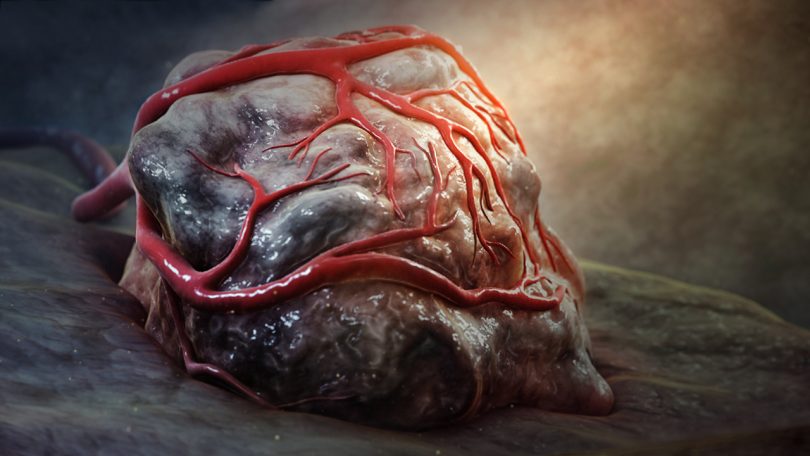Cannabidiol (CBD) can do numerous things, so much so that it’s been dubbed as the 21st-century miracle worker. While some claims are fictitious and the result of false marketing, a good number are backed by science. CBD plays a significant role in managing pain and inflammation, sleep, mood, hormonal control, substance addiction, seizures, neurological disorders, and diabetes. When it comes to cancers, there is good reason to practice cautious optimism.
Case Study Evidence
An 80-year old woman with a chronic history of tobacco smoking was diagnosed with lung cancer. [1] However, she declined conventional treatment offered to her by the doctors and instead opted for “watchful waiting.” She was later introduced to CBD by a family member and began dosing two to three times daily for two and a half years. During this period, the patient did not stop smoking.
Tumor “Miraculously” Shrinks
After 2.5 years, the patient’s tumor had shrunk significantly with a 76% reduction in size. The patient also did not experience any significant adverse effects during the period. [1]
Had she taken the conventional “chemo-radiotherapy” route, this would probably have been a different story altogether. Chemo-radiation is known to take a toll on patients due to severe side effects that include loss of hair, severe nausea and vomiting, massive loss of weight, pain, mouth sores, skin changes, and extreme fatigue.
Did the CBD Shrink The Tumor?
Skeptics are likely to raise this question, what if the tumor just shrunk on its own. Cancer is primarily considered a linear process; once a cell starts to mutate, it will continue to mutate until something is done to stop the mutation. Disappearing tumors are not common, but they have been reported in testicular cancer. [2] So far, there are no reported cases of self-shrinking lung tumors. Therefore, it is not far-fetched to suggest that CBD played a role in shrinking the woman’s tumor.
Does CBD Shrink Tumors?
CBD may have a role to play in suppressing tumor growth, as one study has revealed. [3] The study revealed that CBD has multi-target cancer effects: anti-proliferative, pro-apoptotic, cytotoxic, anti-invasive, anti-antiangiogenic, anti-inflammatory, and immunomodulatory properties. It has also shown potential in suppressing liver cancer. [4]
Early this year, a cannabis-based mouth spray was approved for human trial testing as a potential treatment for a type of brain cancer known as glioblastoma. This is the first human trial approved for testing the efficacy and safety of cannabinoids in treating cancer.
Conclusion
This case study adds to the existing preliminary evidence on the potential of cannabinoids in cancer treatment. Lung cancer is a leading cause of death in the United States. Conventional cancer treatment is associated with overwhelming and life-limiting adverse events. The relative safety and efficacy of CBD justify further research in this area.
Image Source
https://commons.wikimedia.org/wiki/File:3D_still_showing_tumor.jpg
References
1- Liew, K. L., Capuano, E., & Yung, B. (2021). Lung cancer patient who had declined conventional cancer treatment: could the self-administration of ‘CBD oil’ be contributing to the observed tumour regression?. BMJ case reports, 14(10), e244195.
2- Astigueta, J. C., Abad-Licham, M. A., Agreda, F. M., Leiva, B. A., & De la Cruz, J. L. (2018). Spontaneous testicular tumor regression: case report and historical review. Ecancermedicalscience, 12, 888.
3- Kis, B., Ifrim, F. C., Buda, V., Avram, S., Pavel, I. Z., Antal, D., Paunescu, V., Dehelean, C. A., Ardelean, F., Diaconeasa, Z., Soica, C., & Danciu, C. (2019). Cannabidiol-from Plant to Human Body: A Promising Bioactive Molecule with Multi-Target Effects in Cancer. International journal of molecular sciences, 20(23), 5905.
4- Shangguan, F., Zhou, H., Ma, N., Wu, S., Huang, H., Jin, G., Wu, S., Hong, W., Zhuang, W., Xia, H., & Lan, L. (2021). A Novel Mechanism of Cannabidiol in Suppressing Hepatocellular Carcinoma by Inducing GSDME Dependent Pyroptosis. Frontiers in cell and developmental biology, 9, 697832.










